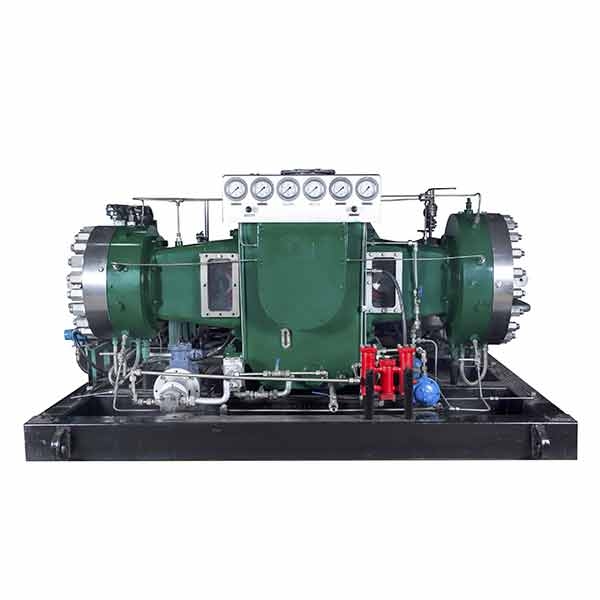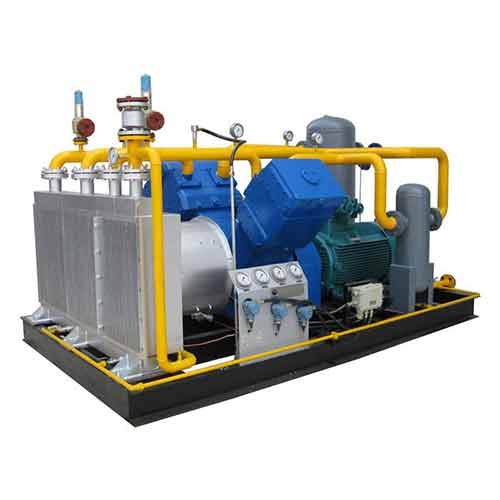CNG Gas Compressor Desinged Powering a Clean and Efficient Future
What does a CNG gas compressor mean?
A mechanical device used to compress natural gas to a greater pressure to be acceptable for storage, transportation, and distribution is a CNG gas compressor, also known as a compressed natural gas compressor. The primary uses of compressed natural gas (CNG), a cleaner-burning substitute for conventional fossil fuels like gasoline and diesel, are as a fuel for automobiles, industrial machinery, and residential applications. The goal is to enhance natural gas’s energy density by decreasing its volume while keeping its mass constant. Thanks to this compression process, natural gas can be transported and stored in greater quantities, making it more useful for various uses.
Powering a Clean and Efficient Future with a CNG Gas Compressor:
Gas compressors for CNG (compressed natural gas) are essential to shift to a greener, more effective energy future. They play a crucial role in the distribution and use of natural gas as a substitute for conventional fossil fuels like gasoline and diesel and as a source of transportation fuel. Here’s how CNG gas compressors can create a future that is both efficient and clean:
Environmental Advantages:
Compressed natural gas burns cleaner than gasoline or diesel. Pollutant emissions like nitrogen oxides (NOx), particulates, and greenhouse gases like carbon dioxide (CO2) are reduced. This positively influences the air and has a less negative effect on climate change. The production of sulfur and volatile organic compounds (VOCs), which help to build smog and acid rain, is reduced when CNG is burned.
Energy effectiveness:
Natural gas has higher energy content than gasoline or diesel, delivering more energy per unit volume. For CNG-powered cars, this leads to better fuel economy and greater driving distances. CNG gas compressor makes it easier to compress natural gas, which makes it possible for its transportation over large distances through pipelines and in mobile storage units to be done more effectively.

Energy Diversity and Security:
Natural gas is abundantly available domestically in many nations, eliminating the need to import oil and boosting energy security. By encouraging the use of CNG for transportation, the energy mix is diversified, and there is less reliance on a single energy source, which decreases the risks of price volatility and supply interruptions.
Financial Gains:
CNG is frequently less expensive than gasoline or diesel on an energy-equivalent basis. Consumers and organizations may benefit from cost reductions; as a result, especially those in sectors like logistics and public transit that depend largely on transportation. Jobs are created due to the CNG infrastructure’s design, production, installation, and maintenance, including the compressors.

Construction of infrastructure:
Additional CNG refueling stations are made available, which promotes the use of CNG-powered cars and gives consumers additional alternatives and convenience. The carbon footprint of compressed natural gas may be further reduced by integrating CNG gas compressors with renewable energy sources like solar or wind power.
Technological Innovations:
The overall feasibility of CNG as a transportation fuel is increased by ongoing improvements in compressor design and efficiency, which result in more dependable and energy-efficient compression systems. Incorporating data analytics and digital technology into CNG infrastructure enables real-time monitoring, preventive upkeep, and performance improvement of the compressor.
The mechanism of a CNG gas compressor:
Natural gas is pulled into the compressor from a supply source, such as a pipeline or storage facility, and is mostly made up of methane.
- The gas is exposed to mechanical forces inside the compressor, which cause the gas’s volume to decrease and its pressure to rise. Pistons, screws, or other compression devices are typically used to accomplish this.
- The higher pressure from the gas’s compression causes it to heat up. Cooling systems are frequently built into compressors to keep the temperature under control and prevent overheating.
- The compressed gas is then kept in high-pressure containers, sometimes called CNG cylinders or tanks. These cylinders can be employed in industrial operations, fitted in automobiles, or kept in fuelling locations for subsequent distribution.
- The compressed natural gas can be delivered via pipelines or sent to CNG refilling facilities, then given to cars with CNG engines. These compressed natural gas-powered engines provide advantages for the environment and the economy.
The Unexpected Advantages of HUAYAN CNG Gas Compressors:
The CNG gas compressor undoubtedly provides a variety of unexpected advantages that support the development of a cleaner, more effective, and sustainable energy future. The following are a few less well-known benefits:
- Reduced Methane Emissions:
Methane makes up the majority of compressed natural gas. Natural gas emits less methane than conventional fossil fuels when mined and delivered without leaks. Because natural gas is managed and transported using CNG gas compressors, methane leaks are reduced, aiding the fight against climate change. Methane is a powerful greenhouse gas.
- Landfills and Waste Management:
The breakdown of organic waste at landfills frequently results in methane production. These landfill gases may be utilized to extract CNG, which can then be compressed using CNG compressors and used as a fuel source. Methane is a significant greenhouse gas that may be reduced by doing this while also supplying energy that would otherwise be wasted.
- Energy Storage and Grid Balancing:
Compressors are one type of energy storage that may be employed. Electricity may be utilized to run CNG compressors and store compressed gas during surplus renewable energy production (solar or wind). Later, when demand is at its highest or renewable energy output is at its lowest, this gas may generate electricity, storing energy and enhancing system stability.
Conclusion:
In addition to compressing natural gas for automotive fuel, CNG gas compressor offers several unexpected advantages. Our compressors contribute to a more sustainable and adaptable energy environment by aiding in methane emission reduction, waste management, energy storage, and distributed power generation. Compressor capacity to adapt to many industries highlights their relevance in the shift to a greener, more productive future. HUAYAN can provide any client globally with full one-stop solutions, and we promise that every customer will receive high-quality products and outstanding customer service.
